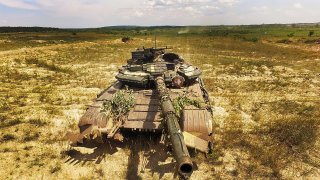Ukraine's Kursk Offensive: Triumph or Tactical Misstep?
In analyzing the Kursk offensive, seventeenth-century maps may be less helpful than more recent history. With its trench lines, artillery barrages, and grinding attrition, the war in Ukraine is often likened to World War I. In that war, both sides sought to break out of a downward spiral of attrition and exhaustion through attacks on the enemy's home front and attempts at strategic maneuver.
KYIV, Ukraine--To bastardize Faulkner, in Ukraine’s capital, the past isn’t past: it is a soldier in the battles of the present and the future. A brand-new exhibit in Kyiv’s World War II museum, housed in the base of the towering Mother Ukraine statue, already showcases the weeks-old incursion into Russia’s Kursk district.
Dubbed Edge, the exhibit first documents, “the history of Ukrainian colonization of the Kursk, Belgorod, and Voronezh territories since the second half of the seventeenth century when the Ukrainian settlements emerged in wild fields and on Tatar trails, with Cossacks being the driving force behind it.” Photos, videos, and a handful of artifacts (the shorn nose of a Lenin statue, a bullet-scarred border sign) then celebrate Ukraine’s biggest battlefield success in many months.
Beyond the museum’s parquet floors, sentiment on the offensive is similarly triumphal. Many feel that Kursk has been a boon to Ukrainian morale. A veteran of elite Ukrainian infantry units, now fighting for structural change at Ukraine’s Ministry of Defense, told me that the operation is “kind of genius.” Soldiers from one of the offensive’s spearhead battalions who I interviewed last week, farther east, were quietly confident. Most wore unsuppressed smiles as they prepared for their next mission.
Kursk’s impact on foreign support for Ukraine is more muted. It is doubtful the offensive has had any meaningful effect on U.S. public opinion on Ukraine, at best a secondary issue for American voters in this chaotic presidential election year. One wonders whether Ukraine would have launched the operation had President Biden dropped out of the presidential race a few weeks earlier, potentially enabling Kamala Harris’ ascent to at least even electoral odds before August.
Hardly anyone expects the embarrassment of Kursk to seriously threaten Vladimir Putin’s hold on power, though Russia was quick to agree to a prisoner swap for some of its conscripts captured in the operation.
The utility of Kursk in military terms is unclear. The offensive has been justified in myriad ways by Ukrainian leaders. It is an attempt to find a soft spot to strike Russia, a hammer blow to Putin’s prestige, a new threat that will tie down enemy resources in border defense, a feint to draw Russian troops away from the grinding campaign in the Donbas, and a bargaining chip in future negotiations.
Kursk may well be some or even all of these things. Its success as an operational raid is undeniable. But the troops sent into Russia, drawn mostly from elite units like the Ukrainian army’s air assault brigades, seem to be in no hurry to leave. Ukrainian officials have spoken about creating a civilian administration for the territory.
Their troops are digging in and preparing for the inevitable Russian counter-offensive, which has also been notable for its lack of urgency. But if Kursk is drawing in Russian forces, it is also tying down some of Ukraine’s best soldiers. A prolonged battle in Kursk will lengthen the lines of both sides.
Perhaps Kursk will prove a triumph for the classic paradigm of coupling an operational offense with a tactical defense, forcing the enemy to attack at a time and place of one’s choosing. But Russia has deferred a decision in Kursk, conducting its defense as an economy of force operation while continuing to hammer away in the Donbas, especially at the transportation hub of Pokrovsk.
Continued success in Kursk, never mind holding this new salient indefinitely, is predicated upon the ability of the hard-pressed Ukrainian brigades in Donetsk to hold on for the foreseeable future. A Russian breakthrough in the Donbas would render Kursk an extremely imprudent sideshow.
In analyzing the Kursk offensive, seventeenth-century maps may be less helpful than more recent history. With its trench lines, artillery barrages, and grinding attrition, the war in Ukraine is often likened to World War I. In that war, both sides sought to break out of a downward spiral of attrition and exhaustion through attacks on the enemy's home front and attempts at strategic maneuver.
The Great War, though, was ultimately settled in its primary theater, the trenches of the Western Front. Repeated defeats and high casualties forced Russia from that war and hastened the end of its incompetent and out-of-touch autocracy. Ukraine’s ability to repeat that feat is an open question at best.
About the Author:
Gil Barndollar is a non-resident fellow at Defense Priorities and a senior research fellow at the Catholic University of America’s Center for the Study of Statesmanship. He writes from Ukraine, where he is currently conducting a research trip.
Image Credit: Creative Commons and/or Shutterstock.


